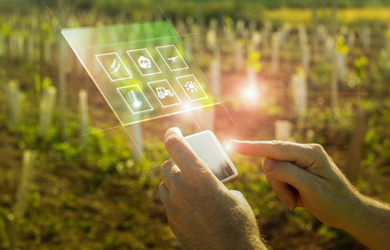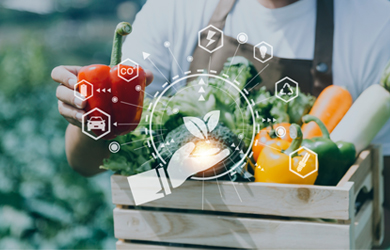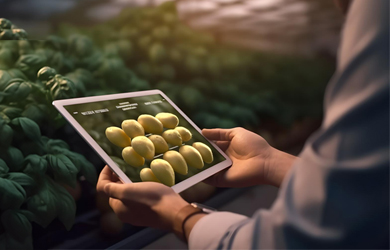Role of Agritech in Transforming and Techpowering Irrigation Practices
The upsurge in population growth along with climate changes over the past few decades has significantly affected the use of water. Additionally, water resources available for agriculture are depleting at an alarming rate.
For years, to overcome the population growth dilemma with fewer water resources, farmers have been using smart irrigation systems in order to be more resourceful. Employing such tech-driven irrigation systems can help farmers overcome water deficits and increase the production of several crops to meet the high requirements of food.
The reason to choose smart irrigation systems over conventional irrigation systems is that they are more efficient. Most of the conventional irrigation systems depend on simple timers and controllers for scheduling, resulting in over-irrigation.
Drawbacks of Conventional Irrigation Systems
More than half of the water used for irrigation is wasted every single day, due to runoff, wind, and evaporation. As a result, farmers started using drip and sprinkler systems. However, these systems too, are not quite efficient and often end up under or over-irrigating crops, affecting the final yield. While some of these disadvantages are due to leaky pipes and faulty pumps, the lack of right information to effectively manage the irrigation systems significantly wastes water.
Over-irrigation can also have a serious environmental impact, leading to soil erosion, nutrient loss, and water pollution. Over-irrigation does not just increase your water bill but excessively wet soils can also affect crop growth and increase the risk of plant diseases.
Agritech – Making Irrigation Systems Smarter and More Eco-friendly
As the availability of global water dwindles, farmers and agricultural companies have been increasingly looking for a solution to over-irrigation. Consequently, agritech is making headway in effective irrigation management, keeping track of information such as soil type and conditions, available water resources, and climatic conditions to make informed decisions to ensure high-quality outcomes.
The smart irrigation system is one of the key applications of agritech that allows farmers to automate their irrigation processes and save water resources. Modern technologies such as IoT, artificial intelligence, machine learning, cloud-based decision support systems, and data management tools further reduce the complexity of implementing dynamic irrigation optimisation.
Dedicated IoT Sensors and Controllers to Optimise Irrigation
A smart irrigation system uses weather and soil moisture data collected through IoT-based sensors and controllers to determine the irrigation need of the field. These tools can help maximise irrigation efficiency by reducing water wastage while maintaining plant health and crop quality. Some of the smart irrigation controllers and sensors are:
Climate-based Controllers: They are also known as evapotranspiration (EV) controllers and gather local weather, meteorological, and historic water use data along with weather data collected on-site to make irrigation run-time adjustments. This allows the landscape to receive the appropriate amount of water.
Soil Moisture Sensor Controllers: These controllers use soil moisture sensors placed underground in the root area to precisely determine water needs. The sensor estimates the soil volumetric water content, representing the portion of the total volume of soil occupied by water. Once this volumetric water content reaches the user-defined threshold, the controllers can be adjusted to open the valves and initiate irrigation.
In addition to soil-based sensors, weather sensors measure local environmental conditions such as temperature, humidity, etc from the soil surface to generate more accurate water requirement predictions. Farmers are also showing increasing interest in plant-mounted sensors that can track slight changes such as swelling and shrinking of plants, indicating the change in water content.
AI and ML Emerge as Promising Solutions for Smart Irrigation
Technologies such as artificial intelligence (AI) and machine learning (ML) have the potential to be a game-changer in tech-driven irrigation systems. With an enormous amount of data collected through sensors and map-based solutions, AI and ML can provide an outlook on the needs of crops, especially water. AI-enabled weather forecasting, crop growth models and predictive analytics give farmers a better idea of general water trends in the field to create more effective irrigation plans.
Machine learning and neural networks also use several factors such as reference evapotranspiration, crop suitability, plant disease classification, and others for the betterment of irrigation management. With the abundance of data, these technologies help in identifying patterns hidden inside the data for optimal water application.
Agribots and Drones to Ensure Accurate Water Usage in Fields
The agriculture industry is using agribots and drones to detect possible pooling or leaks in irrigation. As the need for more efficient water usage increases, agricultural companies are relying on drones paired with conventional and thermal cameras that can detect and see any changes in the field from above that humans cannot from the ground.
Agricultural drones can spot and detect which crops are being watered at what time, thus allowing farmers to effectively use water resources. Moreover, agribots and drones can also be used for the purpose of precise application of water resources across the fields. This can help in yielding crops of the highest quality standards without any misuse of water resources.
In this way, agritech-based irrigation has proven to mitigate several issues for agribusinesses including overwatering, runoff, and nutrient leaching. Smart irrigation that focuses on water conservation while also meeting adequate crop needs is expected to remain a huge trend in agriculture going forward. To stay at the forefront of the competition, FarmERP provides smart irrigation solutions with its expertise in modern agricultural technologies. Contact us to know more.





